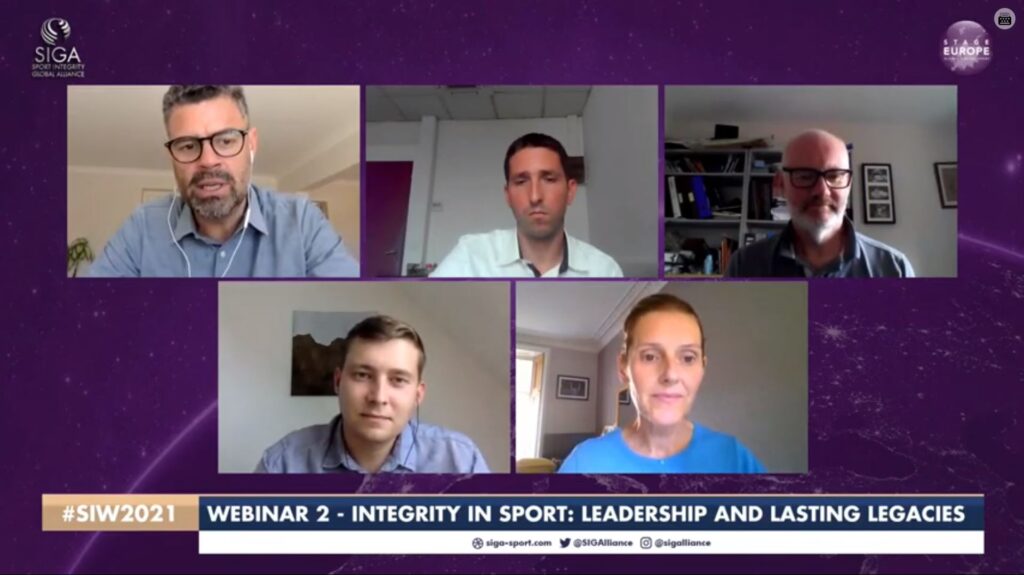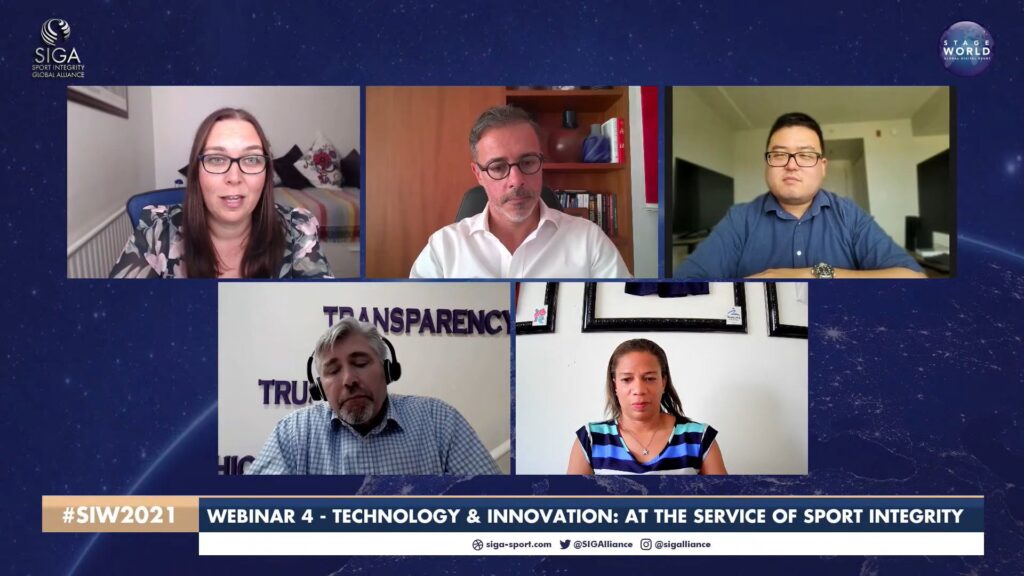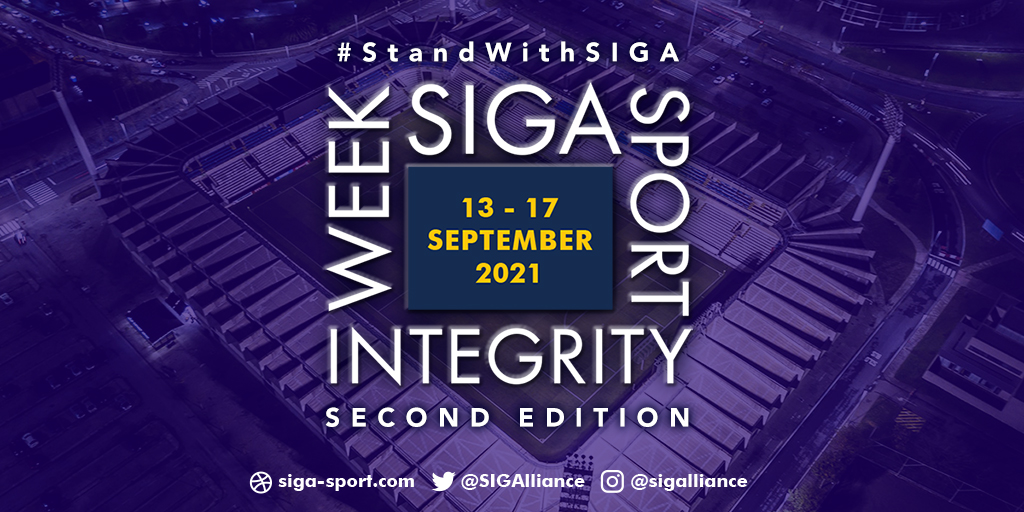The topic for day 4 of SIW2021 was Sports Business, Media, Technology & Innovation. During the second half of the day, Guy Laurent-Epstein, UEFA’s Marketing Director, revealed the organisation is preparing to go through SIGA Independent Rating and Verification System. Learn more about the following panels: Integrity in Sport: Leadership and Lasting Legacies, Global Business: Pressing For Integrity, and Technology & Innovation: at The Service Of Sport Integrity
Don’t miss the chance to watch on-demand.
Day 1 / Part 1/2
Day 1 / Part 2/2
Day 2 /Part 1/2
Day 2 /Part 2/2
Day 3 /Part 1/2
Day 3 / Part 2/2
Day 4 / Part 1/2
Integrity in Sport: Leadership and Lasting Legacies
(Watch Here)

Sport is the proverbial empty flask that can be filled with positive or negative values, disseminated to a global audience and influential beyond compare. Images of racial abuse from football’s terraces provide compelling juxtaposition to the black power salute of the 1968 Olympics to Colin Kaepernick taking a knee and helping to kickstart a global movement. These historical benchmarks can be found throughout sport and speak to all social issues, including but not limited to race, gender, inclusion and diversity – it is clear that key societal issues are intrinsic to the fabric of sport and vice versa. This panel, moderated by Pedro Pinto, CEO and Founder of Empower Sports, explored the challenges and opportunities this presents and how, through sport, peoples lives can be changed in ways that extend far beyond the field of play. There are many hurdles still to be overcome but there are also lights shining through that serve as both inspiration and motivation for change.
Slaven Maric, Advisor to the Organizing Committee of Youth Sports Games, Youth Sports Games
“Sport is something that unites us and if we are too much focused on the results and on the success we forget about the others, we forget about the important values in sport. In today’s world we are just too much notice to success. No one is giving any attention to the sacrifices you have to do, about the moral values, about learning to lose. We should all look for the wider picture of what sport is about, as that would help saving the integrity, and keep the industry honest.”
“We all agree that women and minorities are underrepresented in the governing bodies, but i believe the situation is changing. Nowadays we have a football club that won the Champions League, and it’s run by a woman. 10 years ago you couldn’t imagine that situation. We all have to work, and get sports back to where it all starts: the streets and the children, to the grassroots, to the amateur sports, and that’s how we will raise the future leaders and include all the groups in it.”
Ashley Brown, Head of Governance, Crisis Club Support & Club Liaison, Football Supporters Association
“From the inclusivity and diversity perspective that comes at the heart of football, if we look at participation what we see on the pitch is incredibly diverse support. We have teams representing all sorts of different areas of the population. Football has been incredibly successful in one respect, but also
we often hear about the racial issues associated with football. It’s often the fans that lead the way to try and resolve these things, while the authorities are left catching up. If i think about what’s a real threat around inclusion and diversity in football, to me is social media and the lack of action by the social media companies. We’ve seen recently, particularly in England, a handful of people posting hatred comments that are actually sort of inflamed to, as if they represent many more people. It’s just a small bucket of people and the social media companies refuse to act, and these people’s voices should be irrelevant voices, but they echo far more loudly than they should be allowed to”
“The governing bodies of football remain pretty much an old boy’s network, and the people that run the game at the very top level tend to be people that have been working in the game for decades, quite often. Therefore, it’s not easy to suddenly turn that around, but we are seeing a change in the operational level. If you look at clubs, staff and some senior staff as well, then there is an increase in diversity. It’s slow, it’s probably not as quick as certain other industries, but there is a lot of positive work now taking place.”
“Look at Cristiano Ronaldo, Lionel Messi and Marcus Rashford: how children look up to and aspire to be like them. But when children look at these guys, they don’t see color, they don’t see anything along those lines. They just see their heroes. So, they have a real opportunity to influence young people and help them following the right path. Marcus Rashford, in England, has been an incredible example in the last year, just making sure that children are fed at school.”
Pavel Klymenko, Head of Policy – Global Monitoring and Human Rights, FARE Network,
“The biggest threat to integrity and to diversity in sports, and in football, in particular, is the inertia of institutions and the institutional discrimination that goes with it. There is a habit of doing nothing, and to safeguard the old structures that don’t give enough space for women and minorities to get into the leadership positions and to be prominent in their sports”.
“If you look at the governance structures of football governing bodies, like FIFA and UEFA, and who sits on their executive, the way the pyramid is built is that the presidents of the national football associations are elected into the executive committee. What happens then is that no women or ethnic minorities are elected presidents of national associations, so you get practically no women or minorities in the UEFA or FIFA executive committees. It’s a system that is self-reproducing, so there needs to be greater recognition. We at FARE have done a study back in 2014 and the situation was pretty horrible: the figure was less than one per cent of people in the position of leadership are women or from ethnic minority backgrounds. The worst thing is that we have done a similar study in 2020, and the situation has hardly changed. It’s still a pretty much-closed shop”.
“I want to stick with the athletes and the athlete activism topic because i think it’s really fascinating. Athletes as role models is a topic that’s been around for a while. Have they become better role models now? Maybe! Or is there a demand from fans who are watching the game? Is there a demand for society to see the role models or to see athletes as caring for social issues, caring for the environment, caring for diversity, caring for their communities and standing up? There seems to be a shift in power
relations, from athletes being shut up like football club’s employees, into someone who takes the power into their own hands. Whether that’s Naomi Osaka who’s saying ‘I’m taking a break for my mental health’, whether that’s Raheem Sterling who’s saying ‘I’m not going to take it anymore, next time i hear monkey chants i’m off the pitch whatever your regulations say’. This is a massive shift, and this is where they’re challenging the institutions to do better. I think the institutions are still not ready to deal with that sort of things. I remember Manuel Neuer, goalkeeper of the German national team during Euro-2020, wearing a rainbow captain armband in a match with Hungary, risking a fine from UEFA. Athletes are challenging, so they’re reconsidering priorities and whether they’re meeting the demand from the fans or whether they’re just being great people who care about social issues that’s a different question, but it’s fascinating how the power relationship changes”.
Jackie Davidson, Assistant Director – Golf Development ,The R&A_
“I have a multi-sport background, having been involved with cycling, golf and swimming. Fundamental to all those sports is integrity and honesty, particularly in golf. The whole sport itself is very much born out of honesty and integrity. What we’re seeing now is a change. The area that I work in, which is women and girls, includes leadership and participation. We’re seeing an increase in the number of women and girls participating across sport, not only in golf. We’re also seeing many more women in leadership positions coming into a sports leadership position. That creates opportunities, much more diversity of that. It also creates a different dynamic to the sports, and those in governance positions have now a great opportunity to create much more opportunities for people from ethnic and culturally diverse backgrounds”.
“In golf many of the organisations, senior leaders are male, not very diverse. There hasn’t been a significant change in that over the last five years. What we are trying to do with one of our programs is trying to develop those future female senior leaders. We’ve embarked on a leadership development programme, bringing in women from all around our jurisdiction, presenting them with the skills and learning and development and experience to try and ensure that they at least stay in golf, that they perform at a higher level, and they also maximize their opportunity to develop in their career.
That’s the way we’re trying to have some influence on ensuring that there are women who are confident and can change at a senior level”.
Global Business: Pressing For Integrity
(Watch Here)

Throughout sport, from grassroots to professional, from recreation to competition, Sport has a symbiotic relationship with business. From manufactures of sports goods, global sponsors, broadcasters, and the financial services industry, and others that wish to be associated with athletes, clubs, leagues or competitions, all use Sport to amplify their outreach, brand value and grow their market share. However, we are now seeing an increasing trend where the quality of character is as important as the size of the trophy cabinet in terms of sponsorship. Integrity matters! This expert panel addresses the current situation and shines a light on the impact global business can have to influence Sport to enhance its governance and instigate greater integrity within the industry.
Christine Franklin, Executive Vice President, Octagon was the moderator of this panel. A panel in which Guy Laurent-Epstein, UEFA’s Marketing Director, said the European Football Confederation was preparing to go through SIRVS.
Kate Beavan, Former Global Director of Hospitality and Experiences, Formula 1
“I’ve been reflecting on 25 years working in sport, and I was thinking about what has changed over three decades. The answer I got to was ‘surprisingly little’. Sponsors continue to sponsor sport. They just do it better and better. Year after year, organizers still organize events. They just keep getting better at doing it. Content is still distributed albeit over different media now, and fans keep coming and buying tickets. So, I came to the conclusion that the single biggest change in my experience has been the rise of consumer and fan activism over the last two decades. In my experience, that started with environmental sustainability maybe a decade ago, through fan activation activism and through consumer activism. More recently it’s been social issues around diversity and inclusion that we’ve all seen. Expectations on sports, and the brands that support sport, have never been higher than they are now. I saw a report that said 64 per cent of consumers thought the companies should have a moral or ethical viewpoint. That’s a big number of our consumers, our fans, out there who think that we should be taking a stand on things. What are the rewards for those sports and the brands that are willing to take the initiative on issues of integrity? I’m thinking obviously about Nike had a 6 billion increase in share value after featuring Colin Kaepernick. 38 per cent of Sport fans are more likely to be loyal to a brand who associates with the sport, and speaks out on racial equality”.
Justin Toman, Head of Sports Marketing, PepsiCo
“Sports truly have the power to change the world. Sport has this unique ability to bring people together, to bring communities together, even countries… In cases like global soccer or the Olympics, sport brings the world together. At its best, sports can be a reflection of the best of humanity: perseverance, hard work, dedication, teamwork, all those things. In order for all that to happen, sports and organizations, and the people that run those, have to have the highest integrity. That’s why it’s so important, in order for all the good to come out of the sport, to be ran the right way and by the right people, with the right motivations”.
“In my mind, integrity is closely linked to things like authenticity and doing the right thing. Sometimes, that is not an easy thing to decide, but sports fans and consumers are demanding, these days, that sports and brands activating in sports have integrity and act with authenticity”.
Michael Robichaud, Senior Vice President, Global Sponsorships, Mastercard
“Listening to Justin Toman definition of Sport, I would add the notion of fair-play. People are excited, they’re out spending their valuable time and money, spending it with friends and family, but at the heart of it they want to know what they’re watching is a fair competition. They want to know that the result is what it should be, based on athleticism and ability, and training and effort. As its core, Sport has always had this element of fairness and. Being part of a global business, as Mastercard is, brings along the notion that a corporation these days can’t just wake up, try to make some money and go home. Consumers vote with their wallet, and as we as we’ve heard consumers have expectations of how companies are going to act”
“We must work together, trying to instil a certain way to do things, but basically we say ‘’you call him a fan, we call him consumer, but it’s that same person showing up, so how can we partner and work with that?’ Anybody who’s been around marketing and sports for any period of time knows the greatest question we always get asked is return on investment. How do you measure value? I’m going to go to my grave never being able to answer it, probably. What we do know is that people like numbers and any company that’s spending money likes numbers. If you have a rating system like SIRVS that actually can put some math and numbers behind how different groups are addressing certain things, and being able to identify it, that talks to a whole completely different audience internally, that they can understand why we’re spending the money the way we do, and why do we pick certain things.”
Guy-Laurent Epstein, Marketing Director, UEFA
“Integrity is the core value of fair play. Authenticity has to be part of what we’re doing as a sports. The evolution of the business of sports is probably to try to translate those values into the world of business, and the relationship that we are building with our partners actually being sponsors and broadcasters needs constant dialogue. The people out there have great expectations on us, regarding sustainability, diversity, gender, equality… Integrity probably is in the center of all these activities, translating those sporting values into our daily administration and business values”.
“100 per cent UEFA can go through SIRVS. I think we should take it on, and we are already doing it. I think we have to anticipate these difficulties, and we have to take it on. I have two companies, Mastercard and PepsiCo, with whom we have a very significant dialogue on how to build that together, and try to make it a better world. It’s our duty to work as an example and make sure that we can deliver those values, going forward”.
Technology & Innovation: At The Service of Sport Integrity
(Watch Here)

In recent years, the widespread introduction of technology has increased performance and worked towards ensuring greater integrity and fair play. Technology and innovation, at its best, are there to extend the limits of Sports performance, provide excitement and top-level entertainment, but also to ensure trust and fair play. However, technological advancement can be used to ensure Sport remains exciting and fair, safe, and free from unscrupulous and unethical behaviours. How can they be used to prevent criminal practices and further strengthen Sport Integrity? How best can technology and innovation be harness? What are the benefits, risks, and rewards? This, and much more, was discussed within this dynamic and forward-thinking session, moderated by Kate Hamer, COO, Co-Founder, AxisStars.
April Holmes, Three Times Paralympian, Paralympic Champion, World Recordist | CEO & Co-Founder, HeroHangout
“I lost my leg about 20 years ago in a train accident. At the time, I knew nothing about the Paralympics and so I was initially devastated. Then, I found out that i could still compete in athletics with the help of a prosthetic device. I didn’t know anyone that was disabled as i was growing up, but I’d always remember seeing the cartoon character of a pirate with a peg leg. I was not going to be given a peg leg. Instead, I was going to be given a more dynamic and more beautiful looking thing than the traditional wooden peg. I would be given a running prosthesis, which is made from carbon fiber. And then, over the years, to see the advances in that particular running prosthesis took us to the point that it has enabled disabled athletes or amputee athletes to be able to go out and run, and be competitive, and run and jump some very competitive times, in some ways surpassing that of able-bodied athletes!”
“There was also another greater advance, but on a different level. You know all the controversy around Nike’s new Vapor Fly, the running shoe that has allowed marathoners to run a marathon in less than two hours. We talk about two drastic advances, which have really both been brought forth because of carbon fibre”.
Pedro Duarte, Director, Corporate External & Legal Affairs, Microsoft
“Carbon fibre prosthetic devices are probably one of the most impactful innovations that we can look at, but there are others that we can have, and I’ll mention two. One is when you look at the in the broader perspective to the athlete’s performance. The use of data and everything around it has been improving athletes performance, not only physical but also mental. It may vary according to what they eat or don’t eat, and many other things around that can impact the athlete’s behavior and performance. It’s quite impressive what technology has been doing in the last few years. What we can predict that will happen in the next few years is also very impressive. The second example that I would like to mention is that technology is taking sports to a new level in terms of putting it more accessible to everyone. It is making it easier to practice sports. Technology can bring sports to a new level in terms of fairness, transparency, and integrity”.
Jason Chung, Esports Business Professor & Attorney| Executive Director of Esports, The University of New Haven
“What’s exciting for me about the technology and especially in esports is the fact that first of all people are cheating. The fact that technology allows them to have aimbots and wallhacks is interesting, and the motivation behind it obviously is because there’s increased money behind it. In a weird way, it points to the success that esports is having currently. The other part is the fact that in terms of the investigation process technology is at the heart of it. A lot of the publishers are realizing that people know their anti-cheat systems are good, and they’re working on them to implement things like AI. At the same time, there’s a growing recognition that the human aspect of actually leveraging that technology and conducting effective investigations is important. For all those reasons, I’m excited about what the future holds”.
Joe Baumgartner, Vice-President, Commercial Affairs and Quality Assurance, Inexto
“I was just more on the theme of spectator accessibility, that brings access to all ages to participate. People can participate earlier in their lives. They can even become the athlete that they might dream to be. The advantage of technology today is that it’s literally at our fingertips. It goes with us, with our phones. It is really a game-changer”.
— END —
ABOUT SIGA
SIGA is the world´s largest coalition in the field of sport´s governance and integrity. Supported by more than 100 international multi-industry supporters, SIGA is an independent and neutral organisation whose mission is to bring about meaningful reforms and enhance the integrity of all sports through a set of universal standards operated by an independent and neutral body. SIGA is the only organisation to bring together sport, governments, academia, international organisations, sponsors, business, rights holders, NGOs and professional services companies, from every region in the world, around a common cause of fostering greater integrity throughout sport.
Click on the hyperlinks for the list of SIGA Members and Committed Supporters and SIGA Partners.
For more information on SIGA, including its vision, mission and reform agenda, please refer to the website: www.siga-sport.com.
To contact SIGA, please email: comms@siga-sport.com.

